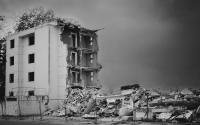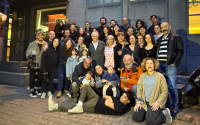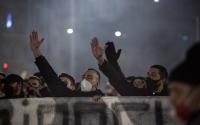By Adi Ophir
January 8, 2009
The assault on Gaza started on Saturday morning, December 27th. In the early afternoon some activists used emails and text messaging to call for a demonstration in downtown Tel Aviv. Almost 2,000 people gather that evening in front of the cinemateque and then walked to the defense ministry compound. Almost every day since there has been a demonstration somewhere, in both Arab and Jewish sectors (including demonstrations at four of the five Israeli universities), but the media report almost only about Arab demonstrations. Even when many Jews are also involved the media describes the event as an expression of national Palestinian struggle instead of portraying it as a civic event in which Jewish and Palestinian citizens in solidarity with the people in Gaza are trying to put up an opposition to their government. Many Arab activists were arrested even before the demonstrations started, as a preemptive measure; hundreds were arrested during the demonstrations, of whom many remained in custody for several days. It is clearly a policy -- to suppress this opposition, portray it as a nationalist, anti-Israeli event, and silence it in the name of public morale in times of war -- and the media fully cooperate with the police.
At the same time the internet is full of alternative news, and emails with descriptions of the horrors in Gaza are distributed regularly. It is not clear how many are exposed to this kind of information. Critics have had better access to the print media than to the electronic media, especially to Tel Aviv's local newspapers. Haaretz too has published several critical articles, some of them very harsh. The Zionist left (Shalom Achshav, Meretz), that publicly and loudly supported the war started calling for a cease fire after a week of fighting. Opposition to the war is not considered good for electoral purposes and with the election only a month from now the good Zionists too are cautious not to appear un-patriotic. But even if you consider them as part of the opposition and add up all these oppositional voices you still get a tiny minority which is marginalized systematically.
The police effort to suppress the radical left is quite new, I think, but it is not the only new thing that gradually becomes clear. What is also new is the open way so many enjoy, let along tolerate, the killing of civilians. There is a sense of satisfaction, even joy among Jewish Israelis. A dozen Israelis killed so far, civilians and soldiers combined, the number of people killed in car accidents in an average week. Palestinians suffer tremendously. In Gaza almost 800 have been killed so far and thousands injured. In fact, the precise number is probably higher because the Palestinians based their counting on reports from hospitals. They don't count those who are still buried under the rubble.
Body count is of the essence, because there are no clear objectives to this assault. Since victory would be elusive any way, and since Hamas is going to win due to the mere fact that it won't be eradicated and it will emerge from the war as a power that will have survived the attack of the most powerful army in the region -- a power that has already enforced a new agenda and must be reckoned with by all other players -- death and destruction remain the only possible indicators of the Israeli sense of victory. The low number of Israeli casualties is also important for the continuation of public support for the "war". Everyone wants it to be as economic and as "clean" as possible. In order to achieve this goal the soldiers' hands must be really dirty. Unidentified commanders speaking to Haaretz from inside Gaza explained how they proceed: with a lot of force. You do not come close to a suspicious house without firing on it first, with a missile, with a tank, then tear off one of its walls with an armored D 9 (a huge tractor), and only then look to see who is inside, if anyone is still alive. It's urban warfare without moral gloves.
These dirty hands however, miraculously go with clean consciousness. Every once in a while a bomb or a shell hits a house and eliminates an entire family. This goes almost unnoticed here. On Wednesday (Jan 7th) they shoot from the sea at an UNRWA school where many refugees from the bombarded surroundings had found shelter. At least 40 civilians were killed. It turned out that targeting a school and killing 40 civilians in a stroke is still enough to make a headline and some stir. The army's response to the news was telling. First they released a video of Palestinians firing rockets from the building, but they later had to admit that the video was taken in 2007 and the incident filmed in it took place when the school was empty. The second attempt to defuse the accusation of a war crime came in the morning papers: Hamas leadership, so the army intelligence claimed, is hiding in the basement of Gaza's main hospital. The implied argument is clear: they use their population as human shields and can't blame us for targeting civilian institutions. And this piece of "information" that nobody can check and very few care to doubt or question as a form of moral argument was enough to make the horror at the UNRWA school disappear.
After the massive bombardment the army resumed the practice of targeted killings. This practice had started even before the ground assault begun and then has accompanied it from above. In the past the IDF was usually careful to target its victims with "smart missiles" that are supposed to have limited "environmental damage", but now they use 1 tonne bombs that smash entire buildings in a second. Last week they "eliminated" a "major" figure in Hamas. The operation was closely observed by the attorney general, who approved every detail of it. They bombed that man's house despite the fact that they knew that many children and women lived there. The guy had 4 wives and 12 children. 2 of the wives and 11 children are dead now. They say that there was a lot of ammunition in the basement and that the international law of war permits such an operation. They also say that they gave the family a warning of a few minutes in which they could have left the house, but the fanatics insisted on staying. Within a few minutes warning you can't get very far from the bombarded area anyway, and how could they eliminate that prominent figure if they really gave enough time to escape? What gives them legal justification is the ammunition. Now imagine the attorney general of the "Democratic Jewish State" asking the intelligence commander: how much ammunition? How many children? And then imagine how he calculates: "so much dynamite is enough to justify the death of one child and so many rockets -- that of one woman." It is the same attorney general that gave legal authorization to the cutting of electricity and fuel supply to Gaza about a year ago. Then too he calculated. He wanted to make sure the hospitals could still operate before he gave his authorization for the new means of catastrophization of the region.
So even in the midst of this assault, some killings from the air are still supervised by the legal authorities. Following a Supreme Court ruling on targeted killing (that approved the tool with certain reservations) it has become necessary to get the lawyers involved in the killing operation. The legal apparatus withdrew from Gaza after the "disengagement" with all other Israeli state apparatuses. Only the army has remained, surrounding the Strip to maintain the siege, turning Gaza into a human pen. Students or sick people who have appealed the army's decision to refuse their requests to get out of Gaza for studies or medical treatment have been consistently denied any assistance at the court, because the responsibility of the Israeli sovereign in their case has been terminated with the disengagement,. Still, the legal apparatus has not disappeared altogether -- it is there as a mechanism of authorization. And a very flexible one at that. The military experts set the rules; the legal experts find the right words for them, rarely forcing minor changes that do not change anything.
The involvement of the lawyers became much less significant when the ground assault started. In fact it is hardly visible at all. It is much more difficult to inject legal considerations in the midst of a rolling attack on the ground, with so many forces, conflicting information, and many decisions to be taken at the spur of the moment. Legal reason can hover in the air; at times it may even precede the jets and slow them down. On the ground, it is moral reasoning that takes its place, yet almost always a-posteriori. This kind of reasoning does not concern many today yet it is still the business of many intellectuals and a façon de parler of some journalists, who often raise the moral question as if in order to get a quick, straightforward answer and get rid of the issue. The prevalent moral argument goes more or less like this: It's not about their children but about ours. The government has a duty to protect its citizens (the duty of the Israeli sovereign to its Palestinian subjects has been denied since the Oslo accords, but in the Gaza Strip after the "disengagement plan" it has been wiped out altogether -- in fact this was one of the main purposes of that plan). And no matter how notoriously deadly our self-defense appears to be, the argument still sticks. In order to save one Jewish child, one is ready to sacrifice the lives of 100,000 of theirs. The number may vary of course; 100,000 is the figure I heard this morning with exactly this formulation from a colleague, a distinguished professor of Hebrew and Yiddish literature. He was speaking in public, very conscious of and proud in his position.
The moral argument comes with ready-made moral dilemmas: You see a terrorist running, carrying a child -- would you shoot him? Some would say yes, some would say no, some would say: I wouldn't know unless I was there. Being there is the first question of course, and it is hardly asked. Passing through the dilemma is a good exercise for moral hygiene and cleansing of one's conscience. One immediately forgets about the political logic of the moral situation, about the forces that impose such dilemmas in the first place, and about the many decisions one has to take before coming to the moment of that seemingly inevitable moral decision. It's a win-win situation. If you decide that shooting is justified you have based your murderous act on moral grounds -- you are not a "cog in the machine" who follows order automatically; if you decide that shooting is not justified in this particular case your hands are clean and your conscience shines and you would be shooting with relief and determination in less embarrassing cases, for example when you don't see the child because he was hiding behind a wall.
Alongside the moral argument there is the ideological one. It is all too familiar. We are different from them; they kill indiscriminately while we don't; they want to eliminate us together with the entire Western civilization while we are only defending ourselves. Since our very existence is at stake (and they are not ready for any compromise that would let us live here in peace) we are locked in a war unto death. It's either us or them, all of us or all of them. We don't want to kill so many of them, of course, but we have no choice. Actually, it's not us -- it's their own ideology that kills them. It's a tragedy, the more liberal Zionist would say, but they have only themselves to blame for what is happening to them. Since they are totally uncompromising, the only way to deter them is to make it so painful for them that they would think twice before shooting at us again. Only we don't know exactly how many bodies would deter them. 750 dead -- the number is rising as I am writing -- several thousand injured, and immense destruction of houses and infrastructure have not deterred them so far. Hence it is necessary to call on more reserve soldiers and widen the scope of this assault. It's a war, "the most justified of our justified wars" said our president, the dear peace-maker Shimon Peres, and we have no choice.
Justification aside, this is not a war. The assault resembles an expedition of a colonial power that goes out of the colonists' enclave to teach a lesson to rebellious barbaric tribes. The kind of raids known from 19th century colonial wars; the kind of raids South Africa conducted often in the seventies and eighties against neighboring countries. Only now the natives not the colonists are in the enclave. The Jewish colonists have turned the entire Palestinian territory into a series of enclaves, more or less separated from each other, and from "Israel proper" (which includes not only the territory west of the 67 border , "the green line," but also most of the Jewish settlements east of the green line). Different enclaves are treated differently. They are more or less "external" to the Israeli mainland, more or less forsaken by the Israeli sovereign and its governmental apparatuses. Gaza is an enclave of a special kind and status. It is an enclave that has turned into a frontier, a no man's land and an experimental field for man's hunting and for a gradual, more or less controlled destruction.
It is not this assault that has turned Gaza into a human pen. The closure started during the 1991 Gulf war, released somewhat during the Oslo years, tightened forcefully when the second Intifada started in October 2000, and then, after the disengagement in August 2005, turned into a full fledge military siege. Without employing much power, simply by closing the Strip, preventing the movement of people and commodities, restricting the flow of gas and electricity, letting the already collapsing sewage system collapse, Israel has turned the Strip into a zone of emergency. Seasonal outbursts of direct military violence that recur at least once a year since 2002 ("Operation Defensive Shield") multiply victims but do not change the basic structure of Israeli domination. In the zone of emergency the entire population has lost -- in the eyes of the Israeli sovereign -- its political status, and has become a mixture of terrorists, suspects, and clients of humanitarian aid. As such Gaza is a laboratory of catastrophization. The present assault is not a war of one army against another, neither a war of a regular army against a guerilla organization, and not even or not simply a war of a regular army against an armed militia. Notwithstanding intentions and justifications, the scope of destruction and the number of civilian casualties are first and foremost a temporary change in the mode of catastrophization: airplane bombs are added to the closure, artillery shells go hand in hand with the cutoff of electricity and the destruction of the sewage system. Catastrophization and not the infliction of a large scale disaster, because the humanitarian corridor is always open. Israel will not let a true humanitarian catastrophe happen in Gaza. There are no final solutions in this conflict, and there won't be one here as well. Israel governs Gaza by an ongoing measured and calculated catastrophization that becomes more brutal, deadly and shameless with each wave of violence. More is yet to come.
Adi Ophir teaches philosophy and critical theory at Tel Aviv University and is a fellow at the Shalom Hartman Institute for Advanced Jewish Studies in Jerusalem.






